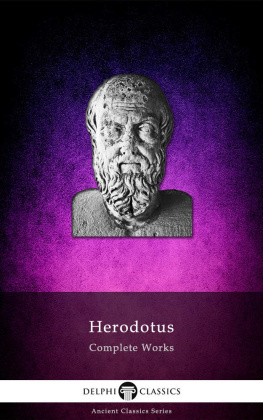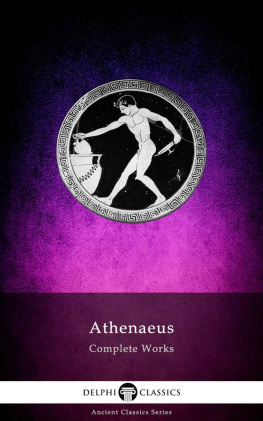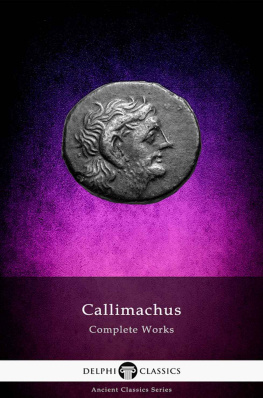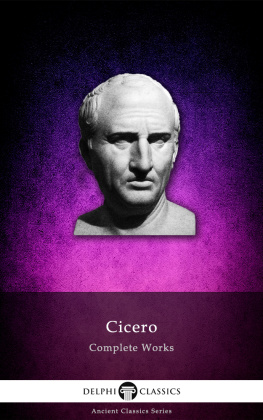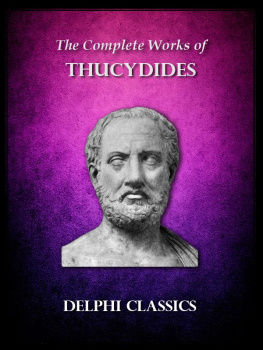The Complete Works of
AULUS GELLIUS
(c. 125 after 180 AD)

Contents

Delphi Classics 2016
Version 1

The Complete Works of
AULUS GELLIUS
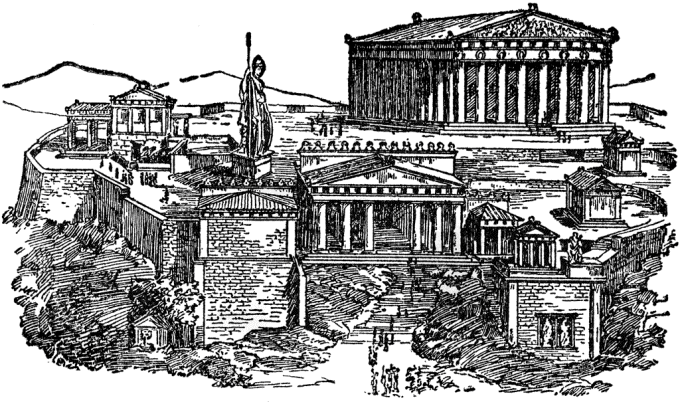
By Delphi Classics, 2016
COPYRIGHT
Complete Works of Aulus Gellius
First published in the United Kingdom in 2016 by Delphi Classics.
Delphi Classics, 2016.
All rights reserved. No part of this publication may be reproduced, stored in a retrieval system, or transmitted, in any form or by any means, without the prior permission in writing of the publisher, nor be otherwise circulated in any form other than that in which it is published.
ISBN: 978 1 78656 377 4
Delphi Classics
is an imprint of
Delphi Publishing Ltd
Hastings, East Sussex
United Kingdom
Contact: sales@delphiclassics.com
www.delphiclassics.com
The Translation

Ancient Rome likely Aulus Gellius birthplace
THE ATTIC NIGHTS

Translated by John C. Rolfe
Aulus Gellius (c. AD 123170) is known almost wholly from his Noctes Atticae , so called because the work was begun during the nights of an Attic winter. The work collects, in twenty books, interesting notes covering philosophy, history, biography, antiquities, points of law, literary criticism, explanations of old words and matters of grammar. The book is valuable due to its many excerpts from other authors whose works are now lost and because of its evidence for peoples manners and occupations. Some at least of the dramatic settings are believed to be based on genuine occasions.
The collection is compiled out of an Adversaria , or commonplace book, in which Gellius had jotted down everything of unusual interest that he had heard in conversation or read in books. The most famous story in The Attic Nights is the fable of Androcles and the Lion , which is often included in compilations of Aesops fables, though it was not originally from that source.
Of the twenty books, all have come down to us complete, except for the eighth, of which nothing remains but the index. The Attic Nights provide a valuable insight of the nature of the society and pursuits of Gellius times and the intriguing view of a gradual, though desultory development of learning of a Roman citizen.
The editio princeps appeared in Rome in 1469. The earliest critical edition was published by Jakob Gronovius (Leyden, 1706). A later edition is that of M. Hertz (Berlin, 188385; there is also a smaller edition by the same author, Berlin, 1886), revised by C. Hosius, 1903, with bibliography. A volume of selections, with notes and vocabulary, was published by Nall (London, 1888). John Carew Rolfes English translation appeared in 1927 for the Loeb Classical Library edition of Aulus Gellius and is the text provided in this edition.
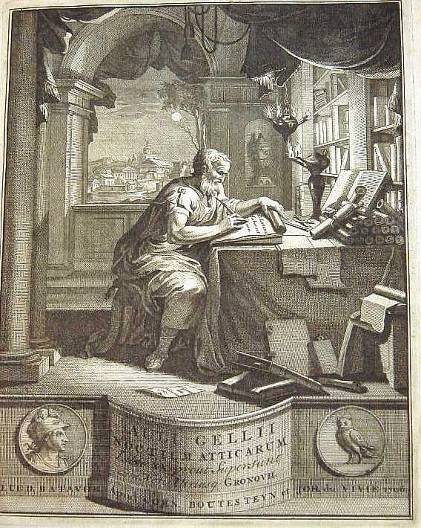
Frontispiece of a 1706 Latin edition of The Attic Nights by Jakob Gronovius
CONTENTS
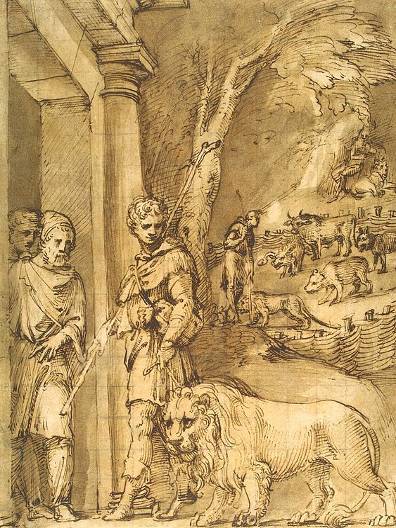
Androcles and the Lion a pen and wash drawing by Baldassare Peruzzi, c. 1530
CHAPTER HEADINGS OF BOOK I
I
Plutarchs account of the method of comparison and the calculations which the philosopher Pythagoras used in determining the great height of Hercules, while the hero was living among men....
II
The apt use made by Herodes Atticus, the exconsul, in reply to an arrogant and boastful young fellow, a student of philosophy in appearance only, of the passage in which Epictetus the Stoic humorously set apart the true Stoic from the mob of pirating triflers who called themselves Stoics .
III
The difficult decision which the Lacedaemonian Chilo made to save a friend; and that one should consider scrupulously and anxiously whether one ought ever to do wrong in the interest of friends, with notes and quotations on that subject from the writings of Theophrastus and Marcus Cicero ..
IV
The care and fine taste with which Antonius Julitanus examined the artful substitution of one word for another by Marcus Cicero in one of his orations.............
V
That the orator Demosthenes was criticized because of his care for his person and attire, and taunted with foppishness; and that the orator Hortensius also, because of similar foppishness and the use of theatrical gestures when he spoke, was nicknamed Dionysia the dancing-girl.......
VI
An extract from the speech delivered to the people by Metellus Numidicus when he was censor, urging them to marry; why that speech has been criticized and how on the contrary it has been defended ..
[p. xli]
VII
In these words of Cicero, from his fifth oration Against Verres, hanc sibi rem praesidio spirant futurum, there is no error in writing or grammar, but those are wrong who do violence to good copies by writing futuram; and in that connection mention is also made of another word of Ciceros which, though correct, is wrongly changed; with a few incidental remarks on the melody and cadence of periods for which Cicero earnestly strove...........
VIII
An anecdote found in the works of the philosopher Sotion about the courtesan Lais and the orator Demosthenes........
IX
What the method and what the order of the Pythagorean training was, and the amount of time which was prescribed and accepted as the period for merely learning and at the same time keeping silence.............
X
In what terms the philosopher Favorinus rebuked a young man who used language that was too old-fashioned and archaic........
XI
The statement of the celebrated writer Thucydides, that the Lacedaemonians in battle used pipes and not trumpets, with a citation of his words on that subject; and the remark of Herodotus that king Alyattes had female lyre-players as part of his military equipment; and finally, some notes on the pipe used by Gracchus when addressing assemblies
XII
At what age, from what kind of family, by what rites, ceremonies and observances, and under what title a Vestal virgin is taken by the chief pontiff; what legal privileges she has immediately upon being chosen; also that, according to Labeo, she is legally neither heir of an intestate person, nor is anyone her heir, in case she dies without a will.................
XIII
On the philosophical question, what would be more proper on receipt of an order to do scrupulously what was commanded, or sometimes [p. xliii] even to disobey, in the hope that it would be more advantageous to the giver of the order; and an exposition of varying views on that subject ..
Next page

